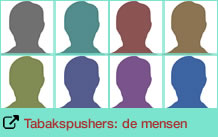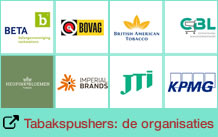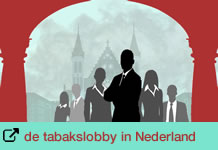NATO think tank offers Philip Morris access to politicians
18 December 2023
Philip Morris International (PMI) has been a major sponsor of NATO Defense College Foundation conferences in Rome for eight years. The prestigious think tank offers the tobacco giant access to politicians, ministers and other influential people from around the world. Critics are baffled, especially now that PMI continues to swell the Russian war chest.
By Tjitske Lingsma
It happens openly and nakedly. On December 7th the NATO Defense College Foundation (NDCF) organised the conference ‘Balkan and Black Sea Perspectives’ in Rome in collaboration with partner Philip Morris Italy. The tobacco giant’s logo is prominently featured on the announcement for the meeting, which focused on the central role the two regions play for NATO and the EU.
The program featured influential figures from international diplomacy, politics and media. Among the speakers were Norwegian Ambassador to Bosnia Herzegovina Olav Reinertsen, Ukrainian MP Halyna Yanchenko and a former Defense Minister of North Macedonia. NATO had delegated Nicola de Santis, head of relations at the Public Diplomacy Division. Other speakers were directors or employees of international research institutes. Editorial chief of the German broadcaster Deutsche Welle in Brussels, Alexandra von Nahmen, led a panel session. Just like the Bulgarian ex-Minister of Foreign Affairs Solomon Passy. The afternoon was closed by Italian MP Giulio Tremonti, who is chairman of the House Committee on Foreign Affairs.
Think tank with close ties to NATO
Research by TabakNee shows that Philip Morris has been a regular sponsor of the NDCF for eight years, which collaborates with NATO in its activities and proudly states on its website that it is the only think tank that bears the name ‘NATO’. “Our mission is to promote the culture of stability and well-being in the North Atlantic region and in NATO partner nations,” the website says. NDCF Chairman Alessandro Minuto-Rizzo is an Italian diplomat and ex-ambassador to the EU, who served as Deputy Secretary General of NATO between 2001 and 2007. The think tank mainly organizes international high-level conferences and conducts research. With special attention to the Middle East, Eastern Europe, the Southern Mediterranean (from Morocco to Lebanon) and West Africa. The speakers and moderators consist of government leaders, (former) ministers, top diplomats, parliamentarians, policy makers, directors and experts from international research institutes and media.
Access to the international arena
In recent years, PMI has subsidised around 25 conferences of the think tank, giving the tobacco multinational access to the international arena. This is done not only through the main guests, panel leaders and the audience, but also through the partners with whom the conferences are organized. At the recent ‘Balkan and Black Sea Perspectives’ meeting, in addition to PMI, there were four other partners: NATO Public Diplomacy Division, NATO Defense College, missile manufacturer MBDA Italy and Fondazione Compagnia di San Paolo.
TabakNee has asked NDCF for a response about its relationship with PMI, but the think tank has not responded.
PMI ‘generous’ sponsor since 2014
The first signs of contact between PMI and the think tank are visible at the conference ‘The futures of integration – Western Balkans’, which NDCF organised in October 2014. One of the speakers is Ahmet Evin. He is then a professor at the Sabanci University Policy Institute in Istanbul, but previously held high positions in the corporate management of PMI and represented Philip Morris companies in Ankara. More than a year later, on January 27, 2016, there is the NDCF conference ‘Eurasia and Armed Radicalism’. Although the tobacco giant is not listed as a sponsor, NDCF chairman Minuto-Rizzo thanks Philip Morris as a ‘generous sponsor’ in the conference report.
PMI writes opening chapter
In the same report, Alvise Giustiniani, then head of the Anti-Illicit Trade department at Philip Morris International, is credited with writing the opening chapter. In it he presents PMI as a reliable partner in the fight against the illegal trade in tobacco products, which not only criminal groups are involved in, but which also forms an important part of the ‘financing portfolio’ of terrorist organizations. Giustiniani explains that PMI’s Anti-Illicit Trade teams are working to build awareness, strategies and partnerships to address these practices, which the tobacco company says lead to revenue losses for governments, companies and PMI itself.
PMI is grateful
Giustiniani writes that he is ‘grateful’ for the opportunity to contribute to the think tank’s ‘high-profile conference’ on crucial themes. He compliments the NDCF for leading the way with a whole-of-community approach and says PMI looks forward with interest to upcoming events. “Let this working together be an excellent first step on a shared path,” said Giustiniani.
That’s exactly what happens. On November 30, 2016, the think tank will organize the conference ‘Deep Maghreb: (in)security and stability – North Africa and its Sahel dimension’ in Rome. Again, PMI is not mentioned in the program, but the colophon of the report states ‘Special thanks to PMI’. In the years that followed, these thankyous were mentioned at almost all conferences organized by the think tank, where PMI was presented increasingly openly and prominently as a partner. These are events with top guests and audiences. It is striking that PMI is not mentioned at two private meetings organized by the think tank.
Patronage of the Italian President
The conferences are focused on the specific regions and themes such as security that the NDCF focuses on. As of April 2017, the think tank organizes no fewer than seven conferences on the Balkans, all of which are sponsored by PMI. The meeting ‘Black Sea and Balkan perspectives. A strategic Region’ on July 28, 2021 in Rome is organised under the patronage of the Italian President.
Naturally, the think tank also focuses on NATO. On May 18, 2017, PMI is mentioned on the program of the conference ‘Is NATO indispensable? The Brussels Summit’. While the think tank already has a list of renowned speakers for this event, things will only be better two years later. On June 27, 2019, the conference ‘NATO at 70: Refocusing for Change?’ will take place at the Atlantic Council headquarters in Washington. It is striking that PMI is not on the program, but is mentioned in the report. NDCF chairman Minuto-Rizzo appears to have been the first to thank Philip Morris International at the opening of the conference. The highlight of the day is the international VIP: Madeleine Albright, former US Secretary of State.
PMI speaker on illegal trade
When, three years later, the think tank pays attention to the North Atlantic Treaty Organization in Rome during the ‘NATO 2022 – A relevant Alliance in a changing world’, which took place on June 23, 2022, PMI is not only thanked as a sponsor, but the tobacco giant is also included in the program. One of the speakers is Piergiorgio Marini, external relations officer of Illicit Trade Prevention of Philip Morris in Rome.
Combating illegal trade is the issue that unites the NDCF and the tobacco company. It was already the theme of the opening chapter that PMI wrote in the 2016 conference report, and it was also central to the interviews that Philip Morris’ STOP ILLEGAL blog had with NDCF chairman Minuto-Rizzo in 2018 and 2020, showing the close and strategic relationship between the think tank and the sponsor. The chairman is also given the opportunity to promote his organization.
Although not explicit in these contributions, the tobacco industry also uses the assumption that criminal and terrorist networks finance themselves through illegal tobacco trade as an argument against anti-tobacco measures such as tax increases, restrictions and bans. Tobacco companies then argue that these measures encourage smuggling and illegal trade through these networks. In 2018, the argument was used in correspondence with the Dutch government in an attempt to stop standard packaging for cigarettes.
African dignitaries
The think tank does not often organize conferences specifically about Africa, but the meeting ‘Africa in Action: Tailoring security to real needs and threats’, which took place on 8 and 9 May 2018, is supported by PMI Impact. This is an initiative of the tobacco multinational that provides subsidies worldwide for projects to combat illegal trade and related crimes. The guest speakers consist of crime fighting experts and people from the highest circles. The opening was provided by the Algerian senator Hafida Benchehida. Giuseppe Mistretta, Africa Director of the Italian Ministry of Foreign Affairs, also spoke at the start of the meeting. Former Libyan Prime Minister Mahmoud Jibril and Youssef Amrani, senior official of the Royal Cabinet in Rabat, chaired panels. Mauritania’s Minister of Defense Mamadou Diallo Bathia was one of the speakers. The day was closed by Alpha Condé, the president of Guinea and former chairman of the African Union. The think tank was also assured of attention in the press with its media partner Al Arabiya English.
Geopolitics and the Arab Region
The Arab region is a priority for NATO. Since 2011, the think tank has organised conferences on geopolitics related to these countries. This happened for the first time in 2017 with the support of PMI. At the conference ‘Arab Geopolitics from Turmoil – Balances, Stability and Regional Order’, the NDCF chairman first thanked two departments of NATO headquarters and media partner Al Arabiya and then said: ‘Special thanks to PMI’. The conference was opened by none other than Ahmed Aboul Gheit, the Secretary General of the Arab League.
Two years later, there was another conference in this series on October 9, 2019: ‘Arab Geopolitics after the Caliphate. How to exit the fragmentation trap’. The NDCF chairman thanked PMI for its “invaluable” support. Ex-Prime Minister Mahmoud Jibril of Libya was a speaker. The Secretary General of the Arab League, Ahmed Aboul Gheit, is again present. Now for the closing of the event.
While PMI is supporting another conference in the ‘Arab Geopolitics’ series in the summer of 2020, the tobacco multinational is ignoring the closed meeting ‘Arab Geopolitics 2020’ organized in November. The tobacco manufacturer will be back in full force in 2021 and 2022. During the ‘Arab Geopolitics 2021’ conference, Ernesto Savona, Director of Transcrime at the Università Cattolica in Milan, talks about a study that his institute conducted with funding from PMI Impact. In addition, PMI has sponsored several other conferences on international security and energy strategies.
Access and reputation
The tobacco lobby watchdog STOP already noted in 2021 that PMI is ‘exceptionally active’ in sponsoring these types of events. For the tobacco manufacturer, this only concerns one thing: cigarettes. “PMI gains direct access to government officials who attend the events, and improves its reputation because it visibly shares a platform with reliable, prestigious organisations and individuals,” STOP said in 2021. “It may be just enough to convince policy makers from around the world that PMI is really changing, despite evidence to the contrary.”
Why guests should stay away
The World Health Organization’s International Framework Convention on Tobacco Control (WHO-FCTC) requires public officials to minimize contact with the tobacco industry as much as possible. The same treaty prohibits any form of marketing and sponsorship by tobacco companies. For this reason alone, politicians, government representatives and diplomats should refrain from participating in NDCF conferences.
PMI also ‘international sponsor of war’
But there are more reasons. “Disgraceful,” says Joshua Abrams, regional director of Eurasia programs at the Campaign for Tobacco-Free Kids, about the think tank’s collaboration with PMI for the ‘Balkans and Black Sea Perspectives’ conference in Rome last week. Abrams points out that while NATO supported Ukraine’s defense against Russia during the war, Philip Morris is a financial supporter of the Russian regime. PMI did not withdraw from Russia after the invasion of Ukraine. Abrams points out that the tobacco company paid nearly 4.8 billion dollar in taxes in Russia and padded its war chest. “It makes it the largest transnational taxpayer in the country and is aiding Putin’s unprovoked invasion of Ukraine,” Abrams said. He points out that the Ukrainian National Bureau for Corruption Prevention has designated tobacco company PMI as an “international sponsor of war.” Abrams: “This cooperation goes against the Western alliance’s support for Ukraine.” Anyone who cares about Ukraine should urge institutions like NATO not to co-sponsor or participate in this conference, Abrams said.
tags: tobacco lobby | PMI | Tobacco-Free Kids | STOP | WHO | FCTC | Oekraïne | Rusland | NAVO | NDCF | illegal trade









 Stichting Rookpreventie Jeugd is geregistreerd als Algemeen Nut Beogende Instelling (RSIN: 820635315 | KvK: 34333760).
Stichting Rookpreventie Jeugd is geregistreerd als Algemeen Nut Beogende Instelling (RSIN: 820635315 | KvK: 34333760).